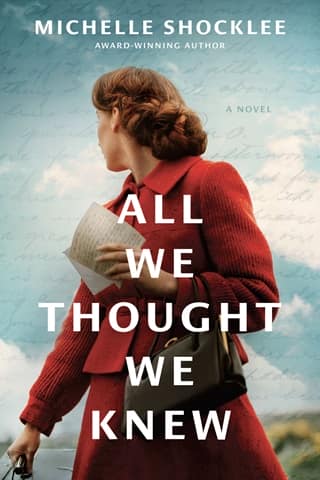Chapter Twenty-Four Ava
TWENTY-FOUR : AVA
CAMP FORREST, TENNESSEE
MAY 1943
I left the office at the end of the long day and sped home. I needed to change clothes and fix my hair before the farewell gathering for the internees.
"I want to thank the German men who helped in the hospital," Colonel Foster said as he, too, exited the building and informed me of his attendance at the gathering. "I can't imagine what they must be feeling, being shipped off to a new camp."
Gertrude and Ivy Lee sat in the parlor listening to the radio when I came out of my room. I hadn't worn the midnight blue cocktail dress since before Richard died, but it felt right to put it on for Gunther's going away.
"My, my, look at you." Ivy Lee's southern accent drew out each word as she inspected me from head to toe. "You must be meetin' someone special for dinner."
Gertrude eyed me with suspicion.
"It isn't like that," I hurried to say. "I'm going to the base for the send-off for the internees. Colonel Foster thinks it's appropriate for those of us who knew and worked with the men to attend."
Ivy Lee grimaced. "Good riddance, I say. Those Germans always gave me the creeps, lookin' like a passel of green beans in their ugly uniforms. I'd bet my last nickel they're here to spy on us. But we'll have even more after all those POWs arrive."
"POWs?" Gertrude said, her eyes wide. "I hadn't heard anything about prisoners of war being brought in."
Ivy Lee puckered her ruby lips. "Oops. I wasn't s'pposed to let out that top secret information yet. Calvin—Colonel Paxton, I mean—said the men comin' were captured in Africa, of all places. I didn't even know there was fightin' goin' on over there."
I restrained the urge to shake the young woman. Her lack of understanding about what was happening in the world never ceased to exasperate. This wasn't the first time she'd shared classified information with Gertrude.
"I don't think Colonel Paxton would be pleased to learn you'd divulged things meant to remain secret."
Ivy Lee huffed. "I don't see why Gertrude shouldn't know what kind of people are livin' on the other side of town." Her lips curved in a devilish grin. "You might be surprised at the secrets I've kept. All sorts of things, including clandestine romances ."
I took my hat from the antique hall tree in the corner. "It isn't wise to listen to camp gossip."
The other woman smirked. "Oh, this ain't gossip. I know all about your foreign fella. About lunch dates and sharin' books." Her eyes swept my gown. "My guess is the dress is for him ."
I froze, suddenly feeling exposed.
How did Ivy Lee know about Gunther? We'd always met on the bench behind the dental clinic, out of sight from the general population of Camp Forrest. Captain Jones, the dentist in charge of the clinic, asked me about my meetings with Gunther early on. When I explained I was helping Gunther with his English so he could continue his medical training after the war, the older man nodded with approval. The next day I noticed the blinds on the window facing the bench were closed and remained so to this day. Whether it had anything to do with Gunther and me, I didn't know, but it did afford us a bit of privacy from nosy patients having their teeth cleaned.
Gertrude glanced between me and Ivy Lee. "What are you talking about?" Her narrowed attention settled on me. "Have you been stepping out with someone?" Anger tinged her words.
"Of course not." My face grew hot under her scrutiny. "Ivy Lee is speaking of the English lessons I've been giving to one of the internees. He hopes to continue his studies in America to become a doctor after the war. I offered to help."
The older woman sneered. "Why would you do that? Those men are our enemies."
They'd had this discussion many times over the past year. Both Gertrude and Ivy Lee felt the men and women who'd been declared enemy aliens should have been deported immediately, even those born in America.
"Most of the men who've been held at Camp Forrest aren't like the POWs. Mr. Schneider and the others were already in the United States when they were arrested. They didn't carry a weapon and shoot at our boys. I'd be more worried about the incoming men than I would the ones being sent to North Dakota."
Gertrude scoffed. "Not all enemies carry a weapon. He could be a spy for the Nazis for all you know. I don't like that you've been helping one of them. Ivy Lee is right. Good riddance."
I refused to continue the argument. "I don't know what time I'll be home. Have a nice evening."
I fumed all the way back to the base.
Like many people in America, my mother-in-law and housemate passed judgement on thousands of people without knowing anything about them other than they were considered enemies of the United States. Yet after getting to know Gunther and hearing his story, I was convinced that, like him, most of the internees throughout the country were innocent victims of government bureaucracy. It wasn't right to hold them against their will indefinitely, disrupting their lives and families, on the small chance one among them could be a spy.
When the guard at the entrance to Camp Forrest approached my open car window, he grinned. "Good evening, Mrs. Delaney. You sure look nice."
"Thank you."
He waved me through, and I wound my way through the vast cantonment to where the internees were housed. A guard I wasn't familiar with checked my credentials while another man looked in the back seat of the vehicle. When they were satisfied, the young soldier told me where to park and allowed me to enter the area I'd only seen from outside the high barbed-wire fences.
Army jeeps and sedans filled the dirt parking area in front of the mess hall. In the distance I saw rows of small, identical huts, and remembered Gunther's comments about the poor quality with which they'd been built. I hoped the accommodations in North Dakota were an improvement, especially with the frigid weather that part of the country was known for.
Music drifted through the open door of the building. Two soldiers stood at the entrance, rifles in their hands, but neither looked at me as they chatted. I moved past them and entered.
The large room was crowded with men wearing green uniforms that told the world they were DOJ detainees. Officers stood off to the side in deep discussion with a group of internees. Tables and chairs were pushed to the edges to create space for a dance floor where couples, each comprised of a man in green and a civilian woman, danced to the fast-paced song coming from a Victrola. They shimmied, laughed, and appeared to have what looked like a good time despite the gloomy occasion.
I scoured the room for Gunther but didn't find him. He hadn't changed his mind about coming, had he?
A long table occupied the far wall and held a large punch bowl and slices of sheet cake. I made my way to it, needing a distraction.
The young woman serving the refreshments smiled and handed me a cup of pink punch. "Do you know one of the fellas leaving for North Dakota?"
I nodded, not relishing small talk just now.
"I do too," she said. "I work in the laundry with some of them. They're nice men. We're going to miss them."
"Yes," I said, grateful to find someone else who had positive things to say about the foreign men. "I'll miss my friend too."
The young woman moved to serve someone else, and I stepped out of the way. When I turned to face the room again, my heart stilled.
Gunther stood a few steps away. Although he wore the same green garb as the other men, he stood out, tall and handsome.
He closed the distance between us.
"Good evening, Mrs. Delaney." His eyes filled with appreciation as he took in my hair, my dress, me. "You look lovely."
"Thank you," I said, breathless.
We watched as more couples moved onto the dance floor.
Gunther turned to me and grinned. "The jitterbug."
I chuckled. "Much easier to dance than the quadrille." I sobered. "I hope you will continue to practice your English. Read out loud to your bunkmates. They'll enjoy the story."
His eyes held mine. The music and dancers faded.
"I will miss our time together."
"I will too."
We stood silent, our gazes locked. There were so many things I longed to say. I wanted to tell him he'd been the best friend I'd ever had. That our lunch dates were the highlight of my week. That I'd come to care for him and didn't want him to leave.
"Would you—" he began.
A deep voice startled us both. "Mrs. Delaney."
I turned to see Colonel Foster. He wore his dress uniform, with medals pinned to his chest. "Colonel Foster, hello."
His glance took in Gunther. "Mr. Schneider."
"Colonel."
"I hope I'm not interrupting," he said.
Gunther took a step back, widening the space between us. "I was just telling Mrs. Delaney how I will miss working in the dispensary. Major Gridley has been very kind and taught me much."
Colonel Foster gave a solemn nod. "He and I have both written letters to the camp commander at Fort Lincoln, recommending you be allowed to work in the hospital or clinic there."
"I appreciate that, Colonel."
Major Gridley joined them, as did other personnel from the hospital, each thanking Gunther for his work. I moved away, giving them more room. Every so often Gunther's gaze found me, and I'd offer an encouraging smile or nod. It pleased me to see others value Gunther and his work, but I wished we could be alone one last time.
The evening went by all too quickly.
"This is the last dance, folks," the soldier operating the Victrola announced.
The opening strains of Glenn Miller's "Always in My Heart" filled the room. Couples moved onto the dance floor, swaying slowly to the sound of the orchestra.
My heart thrummed when I found Gunther's gaze on me, despite the major speaking to him.
"Excuse me, gentlemen." He stepped out of the circle of men. "Mrs. Delaney, would you do me the honor of dancing with me?"
Although I knew Colonel Foster and the others watched, I nodded. "Yes, Mr. Schneider."
He took my hand and led me onto the crowded floor, yet all I knew was the feel of his arm around my waist and my hand clutched in his as we began to move to the music. Soon, a man's voice joined the instruments, telling a sad tale of being far away from the woman he loved, and reminding her of the songs of love they sang when they were together.
Gunther's hand on the small of my back moved me closer to him, and I went willingly. I closed my eyes, memorizing the feel of him, the smell of soap clinging to his skin, his warm breath on my cheek.
The vocalist continued his story of love, promising that one day, even though the skies are gray, the sun will break through, and he and his lover will meet again. Until then... "You are always in my heart."
The music ended, yet Gunther didn't release me.
"I will miss you, Ava," he whispered close to my ear. "May I write to you?"
I gripped his fingers, fighting tears. "Yes."
When we drew apart, his eyes shone with moisture. "Thank you. For everything."
I nodded, not ready to say goodbye. "I'll come to the train station tomorrow."
"I would like that."
Movement reminded us we weren't alone. People began to leave the mess hall, offering good wishes to the internees as they departed. When I stepped away from Gunther, I found Colonel Foster's gaze on us.
His frown eased when he approached and shook Gunther's hand. "I appreciate your hard work over the past year, Mr. Schneider. You've been a fine addition to the dispensary staff. When the war ends, I hope you will resume your studies."
"Thank you, sir," Gunther said.
The colonel turned to me. "Let me walk you to your car, Mrs. Delaney. It's dark out."
I couldn't refuse. "Thank you." I turned to Gunther. "Good night, Mr. Schneider."
"Good night," he said, including the colonel in his farewell.
As I drove home, tears flowed down my cheeks, the feel of Gunther's arm around me fresh and sweet.
I was in love with Gunther Schneider, I finally admitted. I think I had been since the day he saved the soldier's life in the mess hall. But he was leaving for North Dakota tomorrow, his future uncertain.
My heart ached with a bitter truth.
At long last, I'd fallen in love, but the man my heart chose was the enemy.
 Fullepub
Fullepub 



